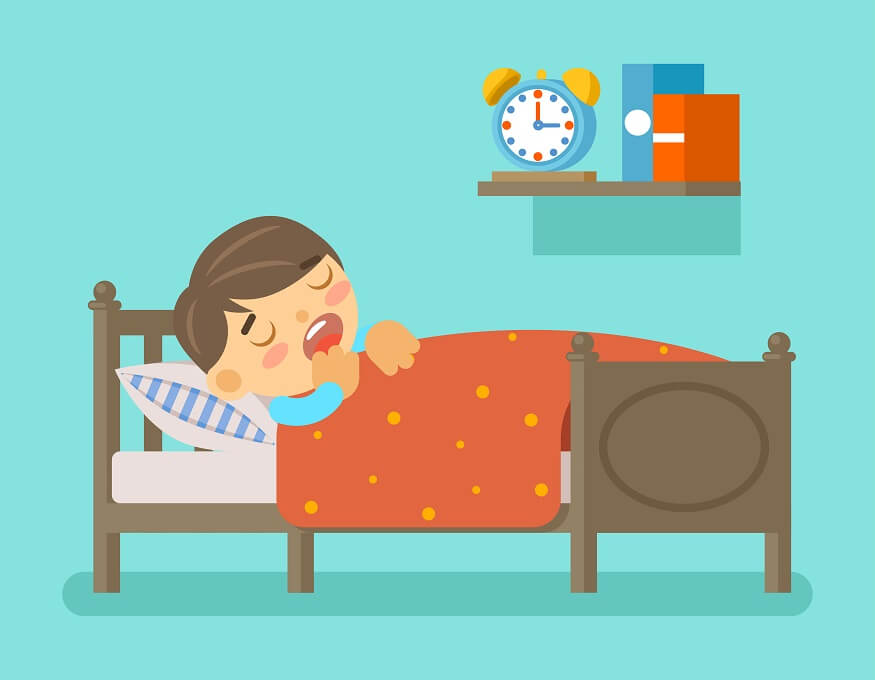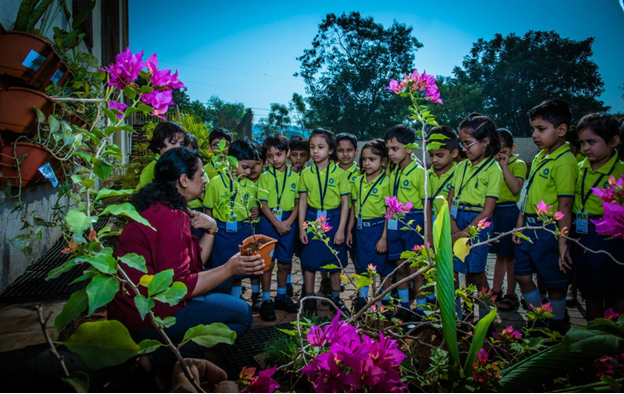Imagine if you run your car continuously without giving it a break, with no service, and with no re-fuelling. It will break down after some time, won’t it? Similarly, our mind and body also need some rest and refuelling to re-energise. Eating nutritious food and a sound sleep does this job for us. Both middle and high school students are inherently high in energy and tend to stretch themselves unless we build in certain routines and habits regarding eating and sleeping. As students, they need to be fresh when they reach school in the morning and that is why sound sleep is of paramount importance. How much sleep is sound sleep must be the question arising in your mind. As per the American Academy of Sleep Medicine children aged between 6 to 12 years should sleep for 9 to 12 hours per day and children aged between 13 to 18 years should sleep for 8 to 10 hours per day. As you can see, there is a range prescribed as each individual is unique and the optimal number can vary depending on individual needs.
An optimal amount of sleep delivers certain key benefits. Lack of sufficient sleep in school students can lead to a range of undesired outcomes among children such as low energy, stress, obesity, lack of attention, high temper, irritability, soreness of the eyes, etc. This blog will highlight the importance of sleep, some of the key benefits delivered by sufficient sleep and some tips on how to get students to sleep better.
Sleep Schedule
Our body needs to be accustomed to a sleeping cycle. Otherwise, the body gets confused. Erratic sleeping cycles can have adverse effects on the functioning of our minds and body. A regular sleep schedule can help drive discipline into the rest of the day for school students. If they have to sleep on time and get up on time, students will plan their tasks during the day accordingly and make sure they complete their assignments before sleep time. This may not be as easy to accomplish as it may sound. Children are easily distracted, especially in this social media world where everyone has a smartphone. The importance of sleep must be emphasised by parents who need to build certain rules regarding the use of technology around bedtime so that social media doesn’t spill into sleeping time. For example, parents can choose from rules such as mobile phones not allowed in the bedrooms, mobile phones not allowed after 8 pm, lights must be switched off sharp at the sleeping time, etc to ensure sleep time is sacrosanct.
Focus and attention
Lack of sufficient sleep can lead to dizziness during classes and other activities. School students who sleep well are active and focused during various school activities. They can concentrate more and for longer hours. Students lacking sleep will feel tired and distracted far too often as compared to students who have had a sound sleep. Lack of proper sleep affects the cognitive ability of the students. They lose out on their sharpness of mind and body. Forgetfulness is another reported outcome of a consistent lack of enough sleep among middle and high school students. This frequently shows in their performance, in both academic and extracurricular activities in school.
To enable children to sleep soundly and sufficiently, parents must ensure that the bed has a good quality mattress and pillow, the sleeping room is not noisy, is optimally dark, relaxing, and maintained at a comfortable temperature.
The quality of sleep depends significantly on what the children do just before their bedtime. Things such as what they read, what they see, what they eat etc can influence their quality of sleep.
There should be at least one hour of a gap between dinner and sleep time. Avoid any caffeinated food or desserts just before bedtime. A brisk walk or any physical activity which tires them a bit physically or a few pages of reading from their favourite book are good preparations for a sound night of slumber.
Behavioural issues
Lack of sleep frequently leads to irritability among children. It’s like how a vehicle makes a lot of noise and creates a lot of problems if it has not been serviced for quite some time. Such behaviour, especially in school students can lead to a poor impression on the teachers and might also affect their relationships with their classmates. This irritability can also rub off on the children’s interaction with their parents and other family members.
Health Issues
When the mind and body do not receive sufficient rest and time to recuperate, both of them will show symptoms of the same. Lack of sleep can lead to depression and eating subsequently leading to obesity-related issues. Lack of sleep can also lead to soreness of the eyes which if not addressed might lead to long-term vision deficiencies. A habit of not sleeping well could be damaging in the long term as it might lead to a lot of lifestyle-based issues such as diabetes, blood pressure, and heart problems. It can also result in issues relating to mental health, such as stress and anxiety. Lack of sleep for longer periods can also lead to depression. Studies have suggested that those who suffer from insomnia are five times more likely to develop depression than those who don’t. Lack of sleep gradually starts showing visible physical symptoms as well, such as dark circles under the eyes, drooping eyes, faster aging of the skin, etc.
Parents need to be meticulous in monitoring the sleeping pattern of their children. The sleeping routine should be sacrosanct. The sleeping area should be optimally comfortable and cosy. The use of smartphones and other tech gadgets just before bedtime must be regulated. Parents must ensure that there does not emerge a pattern of sleep deprivation among their children. If they do see any such indications, they must take swift corrective measures.
At EuroSchool we provide sufficient awareness and support to both our students and their parents about maintaining healthy sleeping habits. Our teachers are always proactive in noticing any symptoms of sleep deprivation among students in their classrooms.










